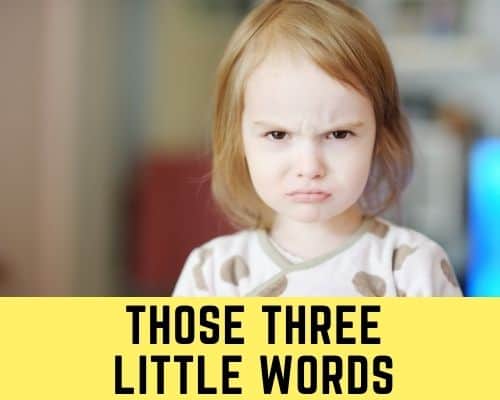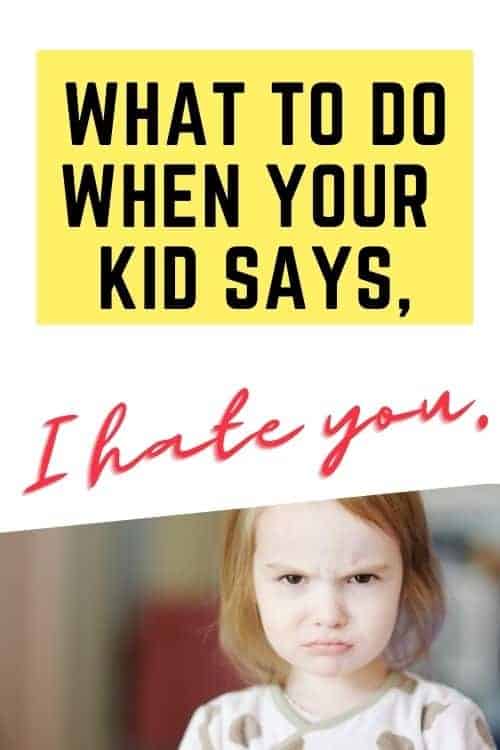
Knock on wood, this has never happened directly to me. None of my children have ever said, “I hate you.” That’s not because I’m amazing. It really probably has nothing to do with me or my parenting. You will notice that I’m not even attempting to write an article about preventing this from happening.
The truth is, most parents will hear this at some point. And I don’t say that to minimize the severity of it. I also don’t say that to make you feel like it shouldn’t hurt if your child does say it. It’s going to sting, and just know that you’re not alone, and it’s not the crushing blow it absolutely feels like.
I have had many moms who have asked me for advice on this and though my children have never said these three exact words, there have been plenty of more hurtful, worse words spoken to me. It doesn’t really matter. When it hurts, it hurts.
You might be thinking, “What could be more hurtful than, ‘I hate you’?” Believe me when I tell you that it can be so much worse. (More on that later!)
So, what do you do when that sweet little mouth that used to give you all kinds of sweet, sloppy kisses spews out these hateful words?
Does it even matter what you do next?
Yes! It matters! It pretty much ALWAYS matters!
Proceed with caution because when your kid says, “I hate you,” your next five steps are imperative!
What to do When Your Child Says, “I Hate You.”
- Keep Perspective–
First of all, as much as it hurts, your child is probably not even meaning to hurt you. Almost every child, from toddlers to young adults, equate hate as being the opposite of love. This is simply not true.
Elie Weisel said, “The opposite of love is not hate, it’s indifference. The opposite of art is not ugliness, it’s indifference. The opposite of faith is not heresy, it’s indifference. And the opposite of life is not death, it’s indifference.”
Indifference is really the opposite of love. Apathy is the opposite of love. Oddly enough, indifference and apathy are also the opposite of hate.
Your child is not going to understand this. Thus, when your child says, “I hate you,” what she really means is, “I hate your decision.” Or, “I hate your position of authority.” It’s not really about you at all. When a child uses this phrase, it is nearly always about circumstances and not about you personally.
If your child was really trying to hurt you, he would say something much more personal and much less vague. “I hate you” is very generic. But, “I don’t care what happens to you.” Or, “If you died tomorrow, I wouldn’t care.” Those things are FAR worse and probably grounds for some counseling.
So, as much as “I hate you” stings, keep it in perspective. Your child doesn’t have the same understanding as you do. She’s not saying, “I don’t love you.” She’s saying, “I’m not happy with you.” And you can handle that!
- Stay in Control–
Whatever you do, please don’t turn on the tears, even if they’re sincere! If you think that it will make your child feel badly and see that he hurt you, it will probably backfire. If you’re actually that hurt by those words, you probably need to bite down hard and not let it show.
Anger might also be your reaction. Even though your feelings of anger might be well-deserved, it will most likely only make things worse. If your child sees that this flusters you, or gets under your skin in any way, you will likely hear it again.
Remember that the reason your child is saying it, in the first place, is because he is not happy with you and wants to make sure you know it! For this very reason, giving your child a response, instead of a reaction, is incredibly important.
Again, if you can keep things in perspective, you’ll be far less likely to lose control.
- Acknowledge Your Child–
Sometimes people say the best thing to do is to ignore it. I’m not sure that’s true because even though you can ignore it, will your child’s other siblings be able to? Or friends? If your child gets no response from this, who’s to say that she won’t try it out on someone else to see if she gets the same response or lack thereof?
Most kids know that these are not kind words. If your child doesn’t know this yet, it’s a great opportunity to teach this, but it also means that it likely won’t ruffle your feathers because it’s a first-time deal.
Really, though, if your child is old enough to be able to speak, you should be teaching her that saying, “I hate you” is not appropriate.
One of my daughters looked up at me and said, “Mom, can I say bad words to satan? Pleeease!” I was wracking my brain in a panic trying to think of WHERE she was learning bad words and WHAT those words were.
It turned out that she was talking about the words, “I hate you.” We had discussed on many occasions how it’s okay to hate something, but not someone…except Satan. We HATE Satan!
She didn’t have to be very old before we were discussing appropriate words and inappropriate words. So, obviously, your child is saying these words for a reason.
Acknowledge your child. You can say something like, “Whoa. You have some very strong feelings. Let’s talk through them.” Or, “I can tell that you’re angry. What are some appropriate words you can use to tell me that?”
And this all sounds great in theory, but nothing is guaranteed to work.
Take heart though! Listening to your child and acknowledging your child always works! Maybe just not immediately.
- Bless Your Child–
Your child is looking for you to give her her way by saying these things. Remember that. She wants to punish you for saying, “No” to her. She wants to make it clear that she will not tolerate your being in authority.
After you acknowledge your child’s feelings, you can bless your child in return. When he says something mean and crummy to you, you can say something kind and loving to him.
When one of my children said mean things to me, I always responded, “No matter how mean you are with your mouth, You will never make me stop loving you!” Or, “Oh, but I love you! And I’ll never change my mind!”
Remember, by this time, you should have acknowledged your child’s feelings, kept it all in perspective, and stayed calm, so blessing your child shouldn’t be as difficult as it sounds!
- Discipline Your Child–
There are many who would disagree with me on this, but hear me out. When your child says, “I hate you,” your child needs to have some kind of consequences. It’s simply not okay. If you don’t discipline your child for doing it, he’ll not only do it to you again, but probably will do it to others as well.
You don’t have to go crazy with discipline! In fact, you shouldn’t. Don’t make it a bigger deal than it is. Keep it in perspective. Again, this is not the worst thing in the world, so don’t discipline your child like it is. You don’t have to even do a lot, but your child needs a consequence for this action.
Whatever your consequence would be for being unkind or disrespectful is enough.
Final Thoughts on When Your Kid Says, “I Hate You”
Oh Mama, even though it definitely hurts at the time when a child says those awful three little words, try to remember that it’s just simply not true, and call it out for what it is. In fact, you might even say, “I know you’re angry right now and that you don’t mean that.”
At the end of the day, it boils down to the fact that children speak as children, and we understand as adults.
So, just try to put yourself in your child’s shoes for a moment. Realize that your child is angry about the circumstances, rather than about who you actually are. Get your thick skin on and remember that if your child “hates you” at some point, you’re probably doing it right.
